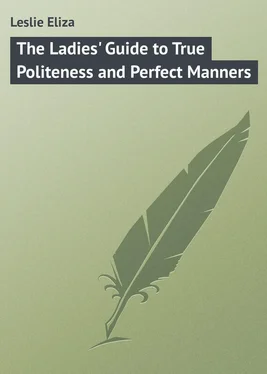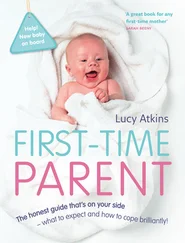Eliza Leslie - The Ladies' Guide to True Politeness and Perfect Manners
Здесь есть возможность читать онлайн «Eliza Leslie - The Ladies' Guide to True Politeness and Perfect Manners» — ознакомительный отрывок электронной книги совершенно бесплатно, а после прочтения отрывка купить полную версию. В некоторых случаях можно слушать аудио, скачать через торрент в формате fb2 и присутствует краткое содержание. Издательство: Иностранный паблик, Жанр: foreign_prose, на английском языке. Описание произведения, (предисловие) а так же отзывы посетителей доступны на портале библиотеки ЛибКат.
- Название:The Ladies' Guide to True Politeness and Perfect Manners
- Автор:
- Издательство:Иностранный паблик
- Жанр:
- Год:неизвестен
- ISBN:нет данных
- Рейтинг книги:4 / 5. Голосов: 1
-
Избранное:Добавить в избранное
- Отзывы:
-
Ваша оценка:
- 80
- 1
- 2
- 3
- 4
- 5
The Ladies' Guide to True Politeness and Perfect Manners: краткое содержание, описание и аннотация
Предлагаем к чтению аннотацию, описание, краткое содержание или предисловие (зависит от того, что написал сам автор книги «The Ladies' Guide to True Politeness and Perfect Manners»). Если вы не нашли необходимую информацию о книге — напишите в комментариях, мы постараемся отыскать её.
The Ladies' Guide to True Politeness and Perfect Manners — читать онлайн ознакомительный отрывок
Ниже представлен текст книги, разбитый по страницам. Система сохранения места последней прочитанной страницы, позволяет с удобством читать онлайн бесплатно книгу «The Ladies' Guide to True Politeness and Perfect Manners», без необходимости каждый раз заново искать на чём Вы остановились. Поставьте закладку, и сможете в любой момент перейти на страницу, на которой закончили чтение.
Интервал:
Закладка:
CHAPTER V.
INTRODUCTIONS
Fashion, in its various unmeaning freaks, sometimes decrees that it is not "stylish to introduce strangers." But this is a whim that, whenever attempted, has neither become general nor lasted long. It has seldom been adopted by persons of good sense and good manners – and very rarely by that fortunate class whose elevated standing in society enables them to act as they please, in throwing aside the fetters of absurd conventionalities, and who can afford to do so.
Non-introduction has been found, in many instances, to produce both inconvenience and vexation. Persons who had long known each other by reputation, and who would have rejoiced in an opportunity of becoming personally acquainted, have met in society, without being aware of it till afterward; and the opportunity has never recurred. One of our most distinguished literary Americans was seated at a dinner-party next to an European lady equally distinguished in literature; but as there were no introductions, he was not aware of her presence till the party was over and the lady gone. The lady knew who the gentleman was, and would gladly have conversed with him; but as he did not speak, because he was not introduced, she had not courage to commence – though she might have done so with perfect propriety, considering who he was, and who she was.
Still worse – from not knowing who are present, you may inadvertently fall upon a subject of conversation that, for private reasons, may be extremely irksome or painful to some of the company; for instance, in discussing a public character. Severe or mortifying remarks may unintentionally be made on the near relative, or on the intimate companion, of one whom you would on no account desire to offend. And in this way you may make enemies, where, under other circumstances, you would have made friends. In such cases, it is the duty of the hostess, or of any mutual acquaintance, immediately to introduce both parties, and thus prevent any further animadversions that, may be mal-a-propos , or in any way annoying. It is safest, when among strangers, to refrain from bitter animadversions on anybody.
In introducing a gentleman to a lady, address her first, as for instance – "Miss Smith, permit me to make you acquainted with Mr. Jones" – or, "Mrs. Farley, allow me to present Mr. Wilson" – that is, you must introduce the gentleman to the lady, rather than the lady to the gentleman. Also, if one lady is married and the other single, present the single lady to the matron, as – "Miss Thomson, let me introduce you to Mrs. Williams." 4 4 It is well to present a lady or gentleman from another city, as "Miss Ford of New York" – "Mrs. Stephens of Boston" – "Mr. Warren of New Orleans."
In introducing a foreigner, it is proper to present him as "Mr. Howard from England" – "Mr. Dupont from France" – "Mr. Wenzel from Germany." If you know of what European city he is a resident, it is better still, to say that he is "from London," – "Paris," – "Hamburg." Likewise, in introducing one of your own countrymen very recently returned from a distant part of the world, make him known as "Mr. Davis, just from China" – "Mr. Edwards, lately from Spain" – "Mr. Gordon, recently from South America." These slight specifications are easily made; and they afford, at once, an opening for conversation between the two strangers, as it will be perfectly natural to ask "the late arrived" something about the country he has last visited, or at least about his voyage.
When presenting a member of Congress, mention the State to which he belongs, as, "Mr. Hunter of Virginia" – "Mr. Chase of Ohio," &c. Recollect that both senators and gentlemen of the house of representatives are members of Congress – Congress including the two legislative bodies. In introducing a governor, designate the state he governs – as, "Governor Penington of New Jersey." For the chief magistrate of the republic, say simply – "The President."
In introducing an officer, tell always to which service he belongs – as "Captain Turner of the Navy" – "Captain Anderson of the Army."
We regret the custom of continuing to give military titles to militia officers. Foreigners are justly diverted at finding soi-disant generals and colonels among men who fill very subordinate stations in civil life – men that, however respectable in their characters, may be deficient in the appearance, manners, or education that should belong to a regular officer. This foolish practice can only be done away by the militia officers themselves (those that really are gentlemen – and there are many) magnanimously declining to be called generals, colonels, &c. except on parade occasions; and when actually engaged in militia duty. Let them omit these titles on their cards, and request that no letters be directed to them with such superscriptions; and that in introductions or in conversation they may be only addressed as plain Mr. It is still more absurd to continue these military titles long after they have ceased to hold the office, – and above all, to persist in them when travelling in foreign countries, tacitly permitting it to be supposed that they own commissions in the regular service.
English tourists (even when they know better) make this practice a handle for pretending, in their books, that the officers of the American army are so badly paid, or so eager to make additional money, that they exercise all sorts of trades, and engage in the humblest occupations to help themselves along. They tell of seeing a captain stitching coats, a major making shoes, a colonel driving a stage, and a general selling butter in market – sneeringly representing them as regular officers of the United States army. Is it true that we republicans have such a hankering after titles? If so, "reform it altogether." And let one of the first steps be to omit the "Esq." in directing a letter to an American citizen, for whom the title can have no meaning. In England it signifies the possessor of an estate in the country, including the office of justice of peace. In America, it means a magistrate only; who may live in a city, and own not an inch of ground anywhere. But why should all manner of men, of all trades, and professions, expect to see an "Esq." after their name, when with reference to them , it can have no rational application?
An introduction should always be given in a distinct and audible voice, so that the name may be clearly understood. The purpose is defeated, if it is murmured over in so low a tone as to be unintelligible. And yet how often is this the case; for what reason it is difficult to divine. It is usual for the introducee to repeat the name of the introduced. This will prove that it has really been heard. For instance, if Mrs. Smith presents Miss Brook to Miss Miles, Miss Miles immediately says, "Miss Brook" – or better still – "Miss Brook, I am glad to meet you," or something similar. Miss Miles then begins a talk.
If you introduce yourself to a lady whom you wish to know, but who does not know you , address her by her name, express your desire to make her acquaintance, and then give her your card. Replying that it affords her pleasure to meet you, she will give you her hand, and commence a conversation, so as to put you quite at ease after your self-introduction.
In introducing members of your own family, always mention, audibly, the name. It is not sufficient to say "my father," or "my mother" – "my son," "my daughter" – "my brother," or "my sister." There may be more than one surname in the same family. But say, "my father, Mr. Warton," – "my daughter, Miss Wood" – or "my daughter-in-law, Mrs. Wood" – "my sister, Miss Mary Ramsay" – "my brother, Mr. James Ramsay," &c. It is best in all these things to be explicit. The eldest daughter is usually introduced by her surname only – as "Miss Bradford" – her younger sisters, as "Miss Maria Bradford" – "Miss Harriet Bradford."
Читать дальшеИнтервал:
Закладка:
Похожие книги на «The Ladies' Guide to True Politeness and Perfect Manners»
Представляем Вашему вниманию похожие книги на «The Ladies' Guide to True Politeness and Perfect Manners» списком для выбора. Мы отобрали схожую по названию и смыслу литературу в надежде предоставить читателям больше вариантов отыскать новые, интересные, ещё непрочитанные произведения.
Обсуждение, отзывы о книге «The Ladies' Guide to True Politeness and Perfect Manners» и просто собственные мнения читателей. Оставьте ваши комментарии, напишите, что Вы думаете о произведении, его смысле или главных героях. Укажите что конкретно понравилось, а что нет, и почему Вы так считаете.












